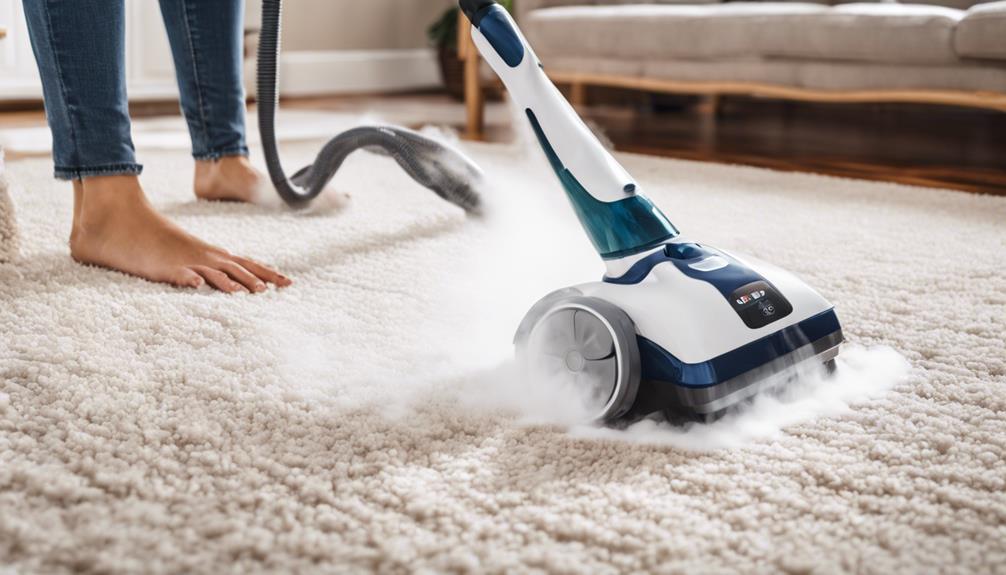Top 10 Remedies for Rabbit Allergies
If you're experiencing rabbit allergies, try these top 10 remedies: Antihistamines ease symptoms by blocking histamines; Air Purifiers with HEPA filters reduce allergens indoors; Allergy-Proof Bedding minimizes exposure to allergens; Nasal Corticosteroids reduce nasal inflammation; Saline Nasal Rinse moisturizes passages and clears congestion; Immunotherapy gradually reduces symptoms; Eye Drops with antihistamines help with eye symptoms; Steam Clean Carpets to eliminate dander; Maintain a Regular Cleaning Schedule; Ensure Filter Maintenance. These remedies can offer relief and improve your comfort around rabbits.
Antihistamines
To alleviate symptoms of rabbit allergies, antihistamines can be effective in reducing histamine-related reactions in the body. Seasonal allergies and exposure to pet dander can trigger allergic reactions in individuals sensitive to rabbit allergens. When exposed to these allergens, the body releases histamines, leading to symptoms such as sneezing, itching, and nasal congestion.
Antihistamines work by blocking the action of histamines, thereby alleviating symptoms caused by the body's immune response to allergens. These medications are commonly available over the counter and are classified as first-generation (sedating) or second-generation (non-sedating) antihistamines. First-generation antihistamines may cause drowsiness and are generally recommended for nighttime use, while second-generation antihistamines are preferred during the day due to their non-sedating properties.
It is important to note that while antihistamines can effectively relieve symptoms of rabbit allergies, they don't address the underlying cause of the allergic reaction. Therefore, it's advisable to combine antihistamine use with strategies to minimize exposure to rabbit allergens, such as keeping rabbits out of living spaces, using air purifiers, and regularly cleaning and vacuuming to reduce pet dander indoors.
Consulting with a healthcare provider or allergist can help determine the most suitable antihistamine and treatment plan based on individual symptoms and medical history.
Air Purifiers
Air purifiers can effectively reduce the presence of rabbit allergens in indoor environments, providing relief for individuals with rabbit allergies. These devices work by drawing air through a filter that traps allergens such as rabbit dander, fur, and saliva particles. When choosing an air purifier for rabbit allergies, opt for a high-efficiency particulate air (HEPA) filter, as it's specifically designed to capture tiny particles like those from rabbits.
Filter maintenance is crucial for the optimal functioning of an air purifier. Regularly check and replace the filters according to the manufacturer's instructions to ensure that the purifier continues to effectively remove rabbit allergens from the air. Neglecting filter maintenance can result in decreased efficiency and may even release trapped allergens back into the environment.
Proper purifier placement is also essential to maximize its effectiveness in reducing rabbit allergens. Position the air purifier in the room where you spend the most time, such as the bedroom or living room. Additionally, place the purifier in a location where there's good airflow and avoid obstructing the intake and exhaust vents.
Allergy-Proof Bedding
When addressing rabbit allergies, a practical step to consider is investing in allergy-proof bedding to further minimize exposure to allergens while you rest. Allergy-proof bedding can serve as a barrier between you and potential allergens, providing a safer sleeping environment.
Natural alternatives are available in the form of bedding options made from organic materials such as cotton, bamboo, or silk. These materials are less likely to harbor allergens compared to synthetic fabrics. Additionally, natural alternatives are often hypoallergenic and gentle on the skin, reducing the risk of allergic reactions.
When selecting allergy-proof bedding, look for options that are specifically designed to block allergens such as dust mites, pet dander, and pollen. Encasing your mattress, pillows, and duvet in allergy-proof covers can help create a protective shield against these common allergens.
Bedding options like dust mite-proof covers are tightly woven to prevent microscopic allergens from penetrating the fabric. These covers are usually machine washable, making it easy to maintain a clean and allergen-free sleeping environment. Remember to wash your bedding regularly in hot water to eliminate any allergens that may have accumulated.
Investing in allergy-proof bedding is a proactive step towards managing rabbit allergies, providing a sanctuary where you can rest comfortably without being exposed to potential triggers.
Nasal Corticosteroids
Consider incorporating nasal corticosteroids into your allergy management plan to effectively alleviate symptoms associated with rabbit allergies. Nasal corticosteroids are a type of medication that can help reduce inflammation in your nasal passages, relieving congestion, sneezing, and itching caused by exposure to rabbit allergens.
These medications work by decreasing the inflammation in the nasal passages, which can significantly improve your allergy symptoms. Unlike oral corticosteroids, nasal corticosteroids are sprayed directly into the nose, targeting the inflammation where it starts without affecting the rest of your body. This targeted approach helps to minimize potential side effects associated with systemic corticosteroid use.
While nasal corticosteroids are generally safe for short-term use, some individuals may experience mild side effects such as nasal irritation or nosebleeds. However, these side effects typically subside once your body adjusts to the medication. It's essential to follow your healthcare provider's instructions when using nasal corticosteroids to minimize the risk of side effects and ensure maximum effectiveness.
When used for an extended period, there's a concern about the potential effects of long-term corticosteroid use. However, nasal corticosteroids are considered safe for long-term use under the guidance of a healthcare professional. Regular check-ups with your healthcare provider can help monitor for any unwanted effects, ensuring that the benefits of nasal corticosteroids continue to outweigh any risks associated with prolonged use.
Saline Nasal Rinse
Incorporate saline nasal rinses into your daily routine to help alleviate nasal congestion and improve symptoms related to rabbit allergies. Saline nasal rinses work by flushing out allergens and irritants from your nasal passages, reducing inflammation and helping you breathe more easily.
Here are four key benefits of using saline nasal rinses for managing rabbit allergies:
- Clearing Sinus Congestion: Saline rinses help to thin mucus in the nasal passages, making it easier to expel congestion. By flushing out excess mucus and allergens, saline rinses can provide relief from sinus pressure and congestion, allowing you to breathe more freely.
- Reducing Nasal Irritation: Irritants from rabbit allergens can lead to nasal irritation, causing symptoms such as itching, sneezing, and a runny nose. Saline nasal rinses help to soothe the nasal mucosa, reducing irritation and discomfort associated with allergies.
- Moisturizing Nasal Passages: Dry nasal passages can exacerbate allergy symptoms and lead to further irritation. Saline rinses hydrate the nasal passages, helping to maintain moisture levels and prevent dryness that can worsen allergy symptoms.
- Enhancing Overall Allergy Management: When used regularly as part of your allergy management routine, saline nasal rinses can complement other treatment methods and improve overall symptom control. By keeping your nasal passages clear and reducing allergen exposure, saline rinses contribute to a more effective allergy management plan.
HEPA Filters
Utilize HEPA filters to effectively capture and remove airborne allergens, such as rabbit dander, from your indoor environment, reducing exposure and potential allergic reactions. HEPA stands for High-Efficiency Particulate Air, and these filters are designed to trap small particles, including allergens, with a high level of efficiency. When choosing a HEPA filter, ensure it meets the standards of capturing at least 99.97% of particles as small as 0.3 microns.
Filter maintenance is crucial for optimal performance. Regularly check the filter and follow the manufacturer's recommendations for cleaning or replacement. Dirty filters can become less effective over time, allowing allergens to circulate in the air. Replacement schedules vary depending on usage and the specific filter type, so it's essential to monitor and replace them as needed.
HEPA filters are most effective in enclosed spaces where they can constantly filter the air. Consider the size of the room where you spend the most time and choose a filter that can adequately cover that area. Some filters are designed for specific room sizes, so be sure to select one that matches your needs for maximum efficiency. By properly maintaining and utilizing HEPA filters, you can significantly reduce rabbit allergens in your living space, providing relief from allergic reactions.
Immunotherapy

When managing rabbit allergies, immunotherapy can be a beneficial treatment option to desensitize your immune system to specific allergens over time. Immunotherapy, commonly known as allergy shots, works by exposing your body to small amounts of the allergen to build tolerance gradually.
Here are key points to consider regarding immunotherapy:
- Effectiveness: Immunotherapy has been shown to be highly effective in reducing allergy symptoms in individuals with rabbit allergies. Through regular injections, your immune system can learn to tolerate the allergens present in rabbit dander, saliva, or urine.
- Duration: The duration of immunotherapy can vary from person to person. Typically, the treatment involves receiving injections once or twice a week initially, followed by maintenance doses given every few weeks. The entire course of treatment can span over several years.
- Side Effects: While generally safe, immunotherapy may cause local reactions such as redness or swelling at the injection site. In some cases, individuals may experience systemic reactions like sneezing, nasal congestion, or even hives. It's essential to discuss any adverse reactions with your healthcare provider.
- Consultation: Before starting immunotherapy for rabbit allergies, consult an allergist or immunologist. They'll assess your specific allergy triggers, medical history, and overall health to determine if immunotherapy is the right choice for you.
Eye Drops
Consider using prescription eye drops as a targeted approach to alleviate symptoms of rabbit allergies affecting your eyes. When exposed to rabbit allergens, your eyes may become itchy, red, and watery due to the body's immune response to the proteins present in rabbit dander, urine, or saliva. Prescription eye drops containing antihistamines or mast cell stabilizers can help relieve these symptoms by reducing inflammation and blocking histamine release in the eyes.
Antihistamine eye drops work by preventing histamine from binding to its receptors, thus reducing itching and redness. They're effective in managing mild to moderate allergic conjunctivitis caused by exposure to rabbit allergens. Mast cell stabilizer eye drops help prevent the release of histamine and other inflammatory substances from mast cells, providing relief for eye irritation and swelling.
It's important to consult an allergist or ophthalmologist before using prescription eye drops to ensure they're safe and appropriate for your condition. They can also provide guidance on proper application techniques and potential side effects. If you wear contact lenses, make sure to remove them before using the eye drops and wait at least 10-15 minutes before reinserting them to prevent any interactions or reduced effectiveness.
Incorporating prescription eye drops into your vision care routine can significantly improve your quality of life by managing rabbit allergy symptoms effectively and preventing complications associated with allergic reactions in the eyes.
Steam Clean Carpets

To effectively reduce rabbit allergens in your living environment, steam cleaning carpets can be a proactive measure to eliminate trapped dander and saliva particles. Carpet maintenance is crucial for allergy prevention, especially in households with rabbits. Here are some key points to consider when steam cleaning your carpets:
- Frequency: Regular steam cleaning of carpets is essential to prevent the buildup of pet dander. Aim to steam clean the carpets at least every 3-6 months, depending on the severity of allergies and the number of rabbits in the household.
- Temperature: When steam cleaning to remove pet dander effectively, ensure that the steam reaches a high temperature. The heat helps to break down allergens embedded in the carpet fibers, making it easier to remove them.
- Proper Ventilation: After steam cleaning the carpets, ensure proper ventilation in the room. This will help in drying the carpets faster and prevent mold growth, which can exacerbate allergies.
- Professional Services: In cases of severe rabbit allergies or extensive carpet contamination, consider hiring professional steam cleaning services. Professionals have the equipment and expertise to deep clean carpets thoroughly, reducing the allergen levels significantly.
Regular Cleaning Schedule
Maintaining a regular cleaning schedule is vital in controlling rabbit allergens in your home environment. To effectively manage allergies caused by rabbits, incorporating proper cleaning techniques into your routine is crucial.
Regular vacuuming using a vacuum cleaner equipped with a HEPA filter can help remove rabbit fur, dander, and other allergens from carpets and upholstery. Additionally, washing linens, curtains, and other fabrics that may harbor allergens in hot water can aid in allergy prevention by eliminating these particles.
Dust and wipe down surfaces frequently to minimize the accumulation of allergens. Use a damp cloth or a microfiber cloth to trap the allergens effectively. When cleaning, pay special attention to areas where your rabbit frequently roams or rests, as these spots are likely to have a higher concentration of allergens. Consider using air purifiers with HEPA filters to further reduce airborne allergens in your home.
Incorporating a regular cleaning schedule that includes these cleaning techniques can significantly reduce rabbit allergens in your living space, thus lowering the risk of allergic reactions. Remember that consistency is key when it comes to allergy prevention. By staying diligent with your cleaning routine, you can create a healthier environment for both you and your rabbit.
Frequently Asked Questions
Can Rabbits Be Hypoallergenic?
Rabbits aren't hypoallergenic because they produce dander, a common allergen. Allergies to rabbits can manifest with symptoms like sneezing, coughing, watery eyes, or skin rashes upon contact with their dander.
It's essential to minimize exposure by keeping rabbits outside or in a well-ventilated area, using HEPA air filters, and washing hands after handling them. Consult with a healthcare provider for appropriate management of rabbit allergies.
Are There Alternative Treatments for Rabbit Allergies?
If you're seeking alternatives for managing rabbit allergies, consider exploring herbal remedies like chamomile or nettle tea which may help alleviate symptoms.
Acupuncture could also be beneficial in addressing allergic reactions.
Homeopathic treatments such as allium cepa or arsenicum album might offer relief.
Aromatherapy using essential oils like lavender or eucalyptus could potentially assist in managing allergy symptoms.
These alternative approaches may provide additional options for individuals dealing with rabbit allergies.
Should I Avoid Contact With Rabbits Completely?
Avoidance is key in managing rabbit allergies. Limiting contact with rabbits can significantly reduce your symptoms. Consider creating designated rabbit-free zones in your home and using air purifiers to minimize allergens.
Regularly wash your hands after handling rabbits or being in their environment. If possible, delegate rabbit care tasks to someone else. By taking these precautions, you can effectively reduce your exposure to allergens and alleviate your symptoms.
Can Rabbit Allergies Develop Over Time?
Yes, rabbit allergies can develop over time due to repeated exposure to allergens present in rabbit dander, saliva, or urine. Allergy triggers such as proteins in these substances can cause the immune system to react, leading to symptoms like sneezing, itching, or hives.
To prevent rabbit allergies from developing or worsening, minimizing contact with rabbits and keeping living spaces clean can help reduce the risk factors associated with these allergies.
Are There Specific Breeds of Rabbits That Are Less Allergenic?
When it comes to rabbit breeds, some are considered more allergy-friendly than others. Certain breeds, like the Rex or Mini Rex, are known to produce fewer allergens compared to other rabbit breeds.
Additionally, cross-breeding solutions have been explored to create hypoallergenic rabbits by mixing breeds that tend to trigger fewer allergic reactions. These allergy-friendly breeds and crossbreeding techniques offer potential options for individuals with rabbit allergies.
Conclusion
In conclusion, managing rabbit allergies can be effectively achieved through a combination of remedies such as:
- Antihistamines
- Air purifiers
- Allergy-proof bedding
- Nasal corticosteroids
- Saline nasal rinse
- Immunotherapy
- Eye drops
- Steam cleaning carpets
- Maintaining a regular cleaning schedule
By incorporating these strategies into your daily routine, you can alleviate symptoms and improve your overall quality of life when dealing with rabbit allergies.
